Macroeconomic Analyses and Forecasts
The research group comprises all macroeconomic analyses, forecasts and policy papers that are carried out on a regular basis at the IWH. These reports contribute significantly to the IWH being one of the leading economic research institutes in Germany. The group focuses on current macroeconomic perspectives in Germany. However, forecasts for an open economy like the German one have to start from thorough and up-to-date analysis of the world economy. Special attention is given to East Germany, Central European countries, and to the European Union as a whole.
Research in this group is linked closely to other projects within the cluster that focus on publishing research papers in refereed journals. In particular, econometric tools developed by Research Group Econometric Tools for Macroeconomic Forecasting and Simulation are applied for the macroeconomic projections, and policy conclusions derived by Research Group Monetary Aggregates, Asset Prices and Real Outcomes are important building blocks for policy recommendations.
IWH Data Project: IWH Macrometer: Macroeconomic Database for the German Länder, East and West Germany
All of the group’s macroeconomic analyses, forecasts and policy papers are available via the Current Forecasting section.
The IWH is member of AIECE (Association d'instituts européens de conjoncture économique).
Research Cluster
Economic Dynamics and StabilityYour contact

Mitglied - Department Macroeconomics
EXTERNAL FUNDING
07.2016 ‐ 06.2022
Joint Economic Forecast
Federal Ministry for Economic Affairs and Energy (BMWI)
The joint economic forecast is an instrument for evaluating the overall economic situation and development in Germany, the euro area and the rest of the world. For this purpose, forecasts of economic activity are generated for the global economy and its major regions. Economic policy recommendations are derived from these forecasts for the euro area and the German economy. The objective of the joint diagnosis, which is commissioned by the Federal Finance Ministry, is to produce a uniform evaluation by all participating institutes. The results are published twice a year as spring and fall forecasts.
01.2013 ‐ 12.2018
Flash Estimate of the Quarterly GDP in Germany
Verlagsgruppe Handelsblatt
01.2018 ‐ 12.2021
Flash Estimate of the Quarterly GDP in Germany
WirtschaftsWoche
12.2015 ‐ 12.2016
Conference “How Can We Boost Competition in the Services Sector?”
European Commission
07.2013 ‐ 06.2016
Joint Economic Forecast
Federal Ministry for Economic Affairs and Energy (BMWI)
The joint economic forecast is an instrument for evaluating the overall economic situation and development in Germany, the euro area and the rest of the world. For this purpose, forecasts of economic activity are generated for the global economy and its major regions. Economic policy recommendations are derived from these forecasts for the euro area and the German economy. The objective of the joint diagnosis, which is commissioned by the Federal Finance Ministry, is to produce a uniform evaluation by all participating institutes. The results are published twice a year as spring and fall forecasts.
09.2015 ‐ 03.2016
Messung der Elastizität der veranlagten Einkommensteuer in Relation zu den Unternehmens- und Vermögenseinkommen
Federal Ministry of Finance (BMF)
01.2013 ‐ 12.2015
Ökonomische Wirksamkeit der Konjunktur stützenden finanzpolitischen Maßnahmen der Jahre 2008 und 2009
Federal Ministry of Finance (BMF)
01.2012 ‐ 12.2015
Quarterly Report on the Economy in Saxony-Anhalt
Ministry of Economy, Science and Digitalisation of the State of Sachsen-Anhalt
‐
Business Cycle Forecasts and Stress Scenarios
Volkswagen Financial Services AG
Refereed Publications
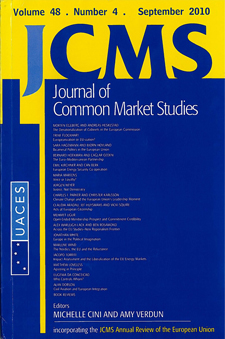
Multidimensional Well-being and Regional Disparities in Europe
in: Journal of Common Market Studies, No. 5, 2017
Abstract
Using data from the OECD Regional Well-Being Index – a set of quality-of-life indicators measured at the sub-national level – we construct a set of composite well-being indices. We analyze the extent to which the choice of five alternative aggregation methods affects the well-being ranking of regions. We find that regional inequality in these composite measures is lower than regional inequality in real GDP per capita. For most aggregation methods, the rank correlation across regions appears to be quite high. It is also shown that using alternative indices instead of GDP per capita would only have a small effect on the set of regions eligible for aid from EU Structural Funds. The exception appears to be an aggregation based on how individual dimensions relate to average life satisfaction across regions, which would substantially change both the ranking of regions and which regions would be eligible for EU funds.
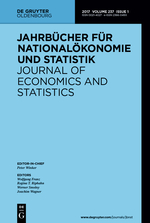
The Research Data Centre of the Halle Institute for Economic Research – Member of the Leibniz Association FDZ-IWH
in: Jahrbücher für Nationalökonomie und Statistik, No. 2, 2017
Abstract
The Halle Institute for Economic Research (IWH) was founded in 1992 and operates three research departments: Macroeconomics, Financial Markets, and Structural Change and Productivity. The IWH’s research structure is designed to foster close interplay between micro and macroeconomic research, however it has its roots in the empirical research conducted on the transition from a planned to a market economy, with a particular focus on East Germany.
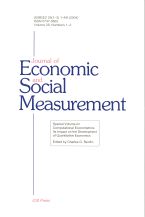
Alternatives to GDP - Measuring the Impact of Natural Disasters using Panel Data
in: Journal of Economic and Social Measurement, No. 3, 2016
Abstract
A frequent criticism of GDP states that events that obviously reduce welfare of people can nevertheless increase GDP per capita. We use data of natural disasters as quasi experiments to examine whether alternatives to GDP (Human Development Index, Progress Index, Index of Economic Well-Being and a Happiness Index) lead to more plausible responses to disasters. Applying a Differences-in-Differences approach and estimates from various panels of countries we find no noteworthy differences between the response of real GDP per capita and the responses of suggested alternative welfare measures to a natural disaster except for the Human Development Index.
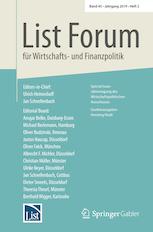
Green Technologies as Industrial Policy Concept? The South of Saxony-Anhalt as a Case Example
in: List Forum für Wirtschafts- und Finanzpolitik, No. 1, 2015
Abstract
The federal action called Energiewende and the Renewable Energy Act (EEG) as part of it have produced hopes in Saxony-Anhalt which were particularly connected with the promotion of green technologies. This paper is composed of an impact analysis of subsidies in general and addresses the impacts of the EEG on companies. Therefore, results of a survey among companies are used that has been conducted in 2013 by the Chamber of Commerce and Industry (CCI) Halle-Dessau in the south of the German State of Saxony-Anhalt.
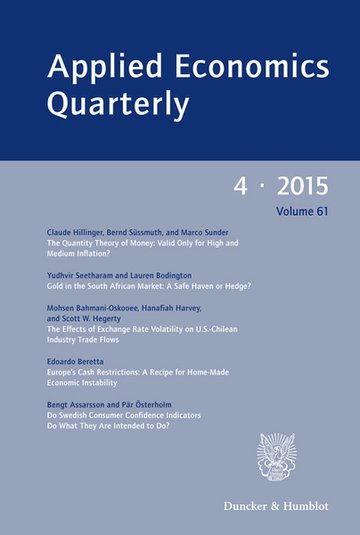
Are there Business Cycles “beyond GDP“? Alternative Measures to GDP at Business Cycle Frequencies
in: Applied Economics Quarterly, No. 2, 2015
Abstract
We discuss properties of alternatives or complements to GDP as a measure of welfare at business cycle frequencies. Our results imply that the suggested indicators show practically no cycle at all and their methodologies can be questioned. First, data are not available at an appropriate quality and frequency. Second, the suggested time series sometimes correlate negatively with each other. Third, cross-section and quasi-panel evidence based on different samples of countries reveals no impact of the stance of the business cycle on some suggested welfare measures. Therefore, alternative welfare measures do not show an equal picture on business cycle frequencies compared to GDP-based measures.













